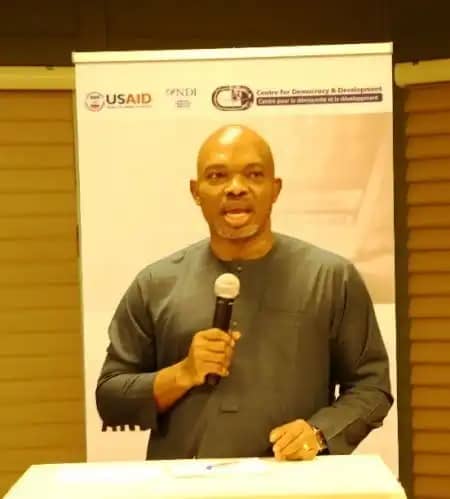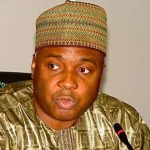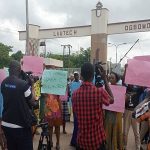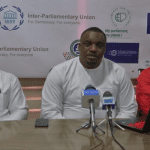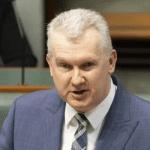The Department of State Security (DSS) and Independent National Electoral Commission (INEC) on Tuesday said the Federal Government may need to consider new legislation as part of efforts to curtail the spread of fake news.
He made this statement today in Abuja at an event organised by Centre for Democracy and Development, CDD.
“Why don’t’ we begin to look at the issue of legislation,” says Dr. Peter Afunanya, the DSS Public Relations Officer (PRO).
“In Japan, for instance, and some other countries, there is a common agreement by convention, even by legislation, their media do not report terrorism because, terrorist feed on publicity. Once you cut the oxygen of publicity, they become disinterested in their actions.”
Further justifying the rationale for the legislation, he asked, “why the average reporter or journalist takes interest in announcing the number of soldiers killed in a combat and they would not find it reasonable to announce how terrorist and Boko Haram members have been attacked, because he is afraid Boko Haram people would come and attack him…”
Afunanya, who insisted the DSS is a victim of the fake news syndrome, identified the false claim that Ibrahim El Zakzaky, leader of the Islamic Movement of Nigeria (IMN) and the former National Security Adviser (NSA) to ex-President Goodluck Jonathan, Sambo Dasuki died while in custody of the DSS.
However, he called for responsible actions from all stakeholders including traditional rulers, the National Union of Road Transport Workers (NURTW), Nigerian Union of Journalists (NUJ).
According to him, absolute law and absolute privilege don’t exist anywhere except for absolute responsibility.
“There are rights to demonstrations and protests, yes, but there are no absolute rights. You claim the right to freedom of movements but if there is a lawful curfew, that right of movement is restricted. Even rights to life, we do not have the right to take our lives not to talk of others. Understanding all of these will help us to be responsible citizens,” the DSS spokesman said.
In his remarks, Festus Okoye, INEC National Commissioner, also decried the negative impacts of fake news, especially during elections.
“I join the idea of the past speakers who called for legislation to regulate fake news,” he stated.
But Idayat Hassan from the CDD and Dr. Garba Abari, Director-General of the National Orientation Agency (NOA) said it would be difficult to gag the social media, but stressed that existing laws on cybersecurity and the penal codes should be well implemented.
The Department of State Security (DSS) and Independent National Electoral Commission (INEC) on Tuesday said the Federal Government may need to consider new legislation as part of efforts to curtail the spread of fake news.
He made this statement today in Abuja at an event organised by Centre for Democracy and Development, CDD.
“Why don’t’ we begin to look at the issue of legislation,” says Dr. Peter Afunanya, the DSS Public Relations Officer (PRO).
“In Japan, for instance, and some other countries, there is a common agreement by convention, even by legislation, their media do not report terrorism because, terrorist feed on publicity. Once you cut the oxygen of publicity, they become disinterested in their actions.”
Further justifying the rationale for the legislation, he asked, “why the average reporter or journalist takes interest in announcing the number of soldiers killed in a combat and they would not find it reasonable to announce how terrorist and Boko Haram members have been attacked, because he is afraid Boko Haram people would come and attack him…”
Afunanya, who insisted the DSS is a victim of the fake news syndrome, identified the false claim that Ibrahim El Zakzaky, leader of the Islamic Movement of Nigeria (IMN) and the former National Security Adviser (NSA) to ex-President Goodluck Jonathan, Sambo Dasuki died while in custody of the DSS.
However, he called for responsible actions from all stakeholders including traditional rulers, the National Union of Road Transport Workers (NURTW), Nigerian Union of Journalists (NUJ).
According to him, absolute law and absolute privilege don’t exist anywhere except for absolute responsibility.
“There are rights to demonstrations and protests, yes, but there are no absolute rights. You claim the right to freedom of movements but if there is a lawful curfew, that right of movement is restricted. Even rights to life, we do not have the right to take our lives not to talk of others. Understanding all of these will help us to be responsible citizens,” the DSS spokesman said.
In his remarks, Festus Okoye, INEC National Commissioner, also decried the negative impacts of fake news, especially during elections.
“I join the idea of the past speakers who called for legislation to regulate fake news,” he stated.
But Idayat Hassan from the CDD and Dr. Garba Abari, Director-General of the National Orientation Agency (NOA) said it would be difficult to gag the social media, but stressed that existing laws on cybersecurity and the penal codes should be well implemented.
The Department of State Security (DSS) and Independent National Electoral Commission (INEC) on Tuesday said the Federal Government may need to consider new legislation as part of efforts to curtail the spread of fake news.
He made this statement today in Abuja at an event organised by Centre for Democracy and Development, CDD.
“Why don’t’ we begin to look at the issue of legislation,” says Dr. Peter Afunanya, the DSS Public Relations Officer (PRO).
“In Japan, for instance, and some other countries, there is a common agreement by convention, even by legislation, their media do not report terrorism because, terrorist feed on publicity. Once you cut the oxygen of publicity, they become disinterested in their actions.”
Further justifying the rationale for the legislation, he asked, “why the average reporter or journalist takes interest in announcing the number of soldiers killed in a combat and they would not find it reasonable to announce how terrorist and Boko Haram members have been attacked, because he is afraid Boko Haram people would come and attack him…”
Afunanya, who insisted the DSS is a victim of the fake news syndrome, identified the false claim that Ibrahim El Zakzaky, leader of the Islamic Movement of Nigeria (IMN) and the former National Security Adviser (NSA) to ex-President Goodluck Jonathan, Sambo Dasuki died while in custody of the DSS.
However, he called for responsible actions from all stakeholders including traditional rulers, the National Union of Road Transport Workers (NURTW), Nigerian Union of Journalists (NUJ).
According to him, absolute law and absolute privilege don’t exist anywhere except for absolute responsibility.
“There are rights to demonstrations and protests, yes, but there are no absolute rights. You claim the right to freedom of movements but if there is a lawful curfew, that right of movement is restricted. Even rights to life, we do not have the right to take our lives not to talk of others. Understanding all of these will help us to be responsible citizens,” the DSS spokesman said.
In his remarks, Festus Okoye, INEC National Commissioner, also decried the negative impacts of fake news, especially during elections.
“I join the idea of the past speakers who called for legislation to regulate fake news,” he stated.
But Idayat Hassan from the CDD and Dr. Garba Abari, Director-General of the National Orientation Agency (NOA) said it would be difficult to gag the social media, but stressed that existing laws on cybersecurity and the penal codes should be well implemented.
The Department of State Security (DSS) and Independent National Electoral Commission (INEC) on Tuesday said the Federal Government may need to consider new legislation as part of efforts to curtail the spread of fake news.
He made this statement today in Abuja at an event organised by Centre for Democracy and Development, CDD.
“Why don’t’ we begin to look at the issue of legislation,” says Dr. Peter Afunanya, the DSS Public Relations Officer (PRO).
“In Japan, for instance, and some other countries, there is a common agreement by convention, even by legislation, their media do not report terrorism because, terrorist feed on publicity. Once you cut the oxygen of publicity, they become disinterested in their actions.”
Further justifying the rationale for the legislation, he asked, “why the average reporter or journalist takes interest in announcing the number of soldiers killed in a combat and they would not find it reasonable to announce how terrorist and Boko Haram members have been attacked, because he is afraid Boko Haram people would come and attack him…”
Afunanya, who insisted the DSS is a victim of the fake news syndrome, identified the false claim that Ibrahim El Zakzaky, leader of the Islamic Movement of Nigeria (IMN) and the former National Security Adviser (NSA) to ex-President Goodluck Jonathan, Sambo Dasuki died while in custody of the DSS.
However, he called for responsible actions from all stakeholders including traditional rulers, the National Union of Road Transport Workers (NURTW), Nigerian Union of Journalists (NUJ).
According to him, absolute law and absolute privilege don’t exist anywhere except for absolute responsibility.
“There are rights to demonstrations and protests, yes, but there are no absolute rights. You claim the right to freedom of movements but if there is a lawful curfew, that right of movement is restricted. Even rights to life, we do not have the right to take our lives not to talk of others. Understanding all of these will help us to be responsible citizens,” the DSS spokesman said.
In his remarks, Festus Okoye, INEC National Commissioner, also decried the negative impacts of fake news, especially during elections.
“I join the idea of the past speakers who called for legislation to regulate fake news,” he stated.
But Idayat Hassan from the CDD and Dr. Garba Abari, Director-General of the National Orientation Agency (NOA) said it would be difficult to gag the social media, but stressed that existing laws on cybersecurity and the penal codes should be well implemented.
The Department of State Security (DSS) and Independent National Electoral Commission (INEC) on Tuesday said the Federal Government may need to consider new legislation as part of efforts to curtail the spread of fake news.
He made this statement today in Abuja at an event organised by Centre for Democracy and Development, CDD.
“Why don’t’ we begin to look at the issue of legislation,” says Dr. Peter Afunanya, the DSS Public Relations Officer (PRO).
“In Japan, for instance, and some other countries, there is a common agreement by convention, even by legislation, their media do not report terrorism because, terrorist feed on publicity. Once you cut the oxygen of publicity, they become disinterested in their actions.”
Further justifying the rationale for the legislation, he asked, “why the average reporter or journalist takes interest in announcing the number of soldiers killed in a combat and they would not find it reasonable to announce how terrorist and Boko Haram members have been attacked, because he is afraid Boko Haram people would come and attack him…”
Afunanya, who insisted the DSS is a victim of the fake news syndrome, identified the false claim that Ibrahim El Zakzaky, leader of the Islamic Movement of Nigeria (IMN) and the former National Security Adviser (NSA) to ex-President Goodluck Jonathan, Sambo Dasuki died while in custody of the DSS.
However, he called for responsible actions from all stakeholders including traditional rulers, the National Union of Road Transport Workers (NURTW), Nigerian Union of Journalists (NUJ).
According to him, absolute law and absolute privilege don’t exist anywhere except for absolute responsibility.
“There are rights to demonstrations and protests, yes, but there are no absolute rights. You claim the right to freedom of movements but if there is a lawful curfew, that right of movement is restricted. Even rights to life, we do not have the right to take our lives not to talk of others. Understanding all of these will help us to be responsible citizens,” the DSS spokesman said.
In his remarks, Festus Okoye, INEC National Commissioner, also decried the negative impacts of fake news, especially during elections.
“I join the idea of the past speakers who called for legislation to regulate fake news,” he stated.
But Idayat Hassan from the CDD and Dr. Garba Abari, Director-General of the National Orientation Agency (NOA) said it would be difficult to gag the social media, but stressed that existing laws on cybersecurity and the penal codes should be well implemented.
The Department of State Security (DSS) and Independent National Electoral Commission (INEC) on Tuesday said the Federal Government may need to consider new legislation as part of efforts to curtail the spread of fake news.
He made this statement today in Abuja at an event organised by Centre for Democracy and Development, CDD.
“Why don’t’ we begin to look at the issue of legislation,” says Dr. Peter Afunanya, the DSS Public Relations Officer (PRO).
“In Japan, for instance, and some other countries, there is a common agreement by convention, even by legislation, their media do not report terrorism because, terrorist feed on publicity. Once you cut the oxygen of publicity, they become disinterested in their actions.”
Further justifying the rationale for the legislation, he asked, “why the average reporter or journalist takes interest in announcing the number of soldiers killed in a combat and they would not find it reasonable to announce how terrorist and Boko Haram members have been attacked, because he is afraid Boko Haram people would come and attack him…”
Afunanya, who insisted the DSS is a victim of the fake news syndrome, identified the false claim that Ibrahim El Zakzaky, leader of the Islamic Movement of Nigeria (IMN) and the former National Security Adviser (NSA) to ex-President Goodluck Jonathan, Sambo Dasuki died while in custody of the DSS.
However, he called for responsible actions from all stakeholders including traditional rulers, the National Union of Road Transport Workers (NURTW), Nigerian Union of Journalists (NUJ).
According to him, absolute law and absolute privilege don’t exist anywhere except for absolute responsibility.
“There are rights to demonstrations and protests, yes, but there are no absolute rights. You claim the right to freedom of movements but if there is a lawful curfew, that right of movement is restricted. Even rights to life, we do not have the right to take our lives not to talk of others. Understanding all of these will help us to be responsible citizens,” the DSS spokesman said.
In his remarks, Festus Okoye, INEC National Commissioner, also decried the negative impacts of fake news, especially during elections.
“I join the idea of the past speakers who called for legislation to regulate fake news,” he stated.
But Idayat Hassan from the CDD and Dr. Garba Abari, Director-General of the National Orientation Agency (NOA) said it would be difficult to gag the social media, but stressed that existing laws on cybersecurity and the penal codes should be well implemented.
The Department of State Security (DSS) and Independent National Electoral Commission (INEC) on Tuesday said the Federal Government may need to consider new legislation as part of efforts to curtail the spread of fake news.
He made this statement today in Abuja at an event organised by Centre for Democracy and Development, CDD.
“Why don’t’ we begin to look at the issue of legislation,” says Dr. Peter Afunanya, the DSS Public Relations Officer (PRO).
“In Japan, for instance, and some other countries, there is a common agreement by convention, even by legislation, their media do not report terrorism because, terrorist feed on publicity. Once you cut the oxygen of publicity, they become disinterested in their actions.”
Further justifying the rationale for the legislation, he asked, “why the average reporter or journalist takes interest in announcing the number of soldiers killed in a combat and they would not find it reasonable to announce how terrorist and Boko Haram members have been attacked, because he is afraid Boko Haram people would come and attack him…”
Afunanya, who insisted the DSS is a victim of the fake news syndrome, identified the false claim that Ibrahim El Zakzaky, leader of the Islamic Movement of Nigeria (IMN) and the former National Security Adviser (NSA) to ex-President Goodluck Jonathan, Sambo Dasuki died while in custody of the DSS.
However, he called for responsible actions from all stakeholders including traditional rulers, the National Union of Road Transport Workers (NURTW), Nigerian Union of Journalists (NUJ).
According to him, absolute law and absolute privilege don’t exist anywhere except for absolute responsibility.
“There are rights to demonstrations and protests, yes, but there are no absolute rights. You claim the right to freedom of movements but if there is a lawful curfew, that right of movement is restricted. Even rights to life, we do not have the right to take our lives not to talk of others. Understanding all of these will help us to be responsible citizens,” the DSS spokesman said.
In his remarks, Festus Okoye, INEC National Commissioner, also decried the negative impacts of fake news, especially during elections.
“I join the idea of the past speakers who called for legislation to regulate fake news,” he stated.
But Idayat Hassan from the CDD and Dr. Garba Abari, Director-General of the National Orientation Agency (NOA) said it would be difficult to gag the social media, but stressed that existing laws on cybersecurity and the penal codes should be well implemented.
The Department of State Security (DSS) and Independent National Electoral Commission (INEC) on Tuesday said the Federal Government may need to consider new legislation as part of efforts to curtail the spread of fake news.
He made this statement today in Abuja at an event organised by Centre for Democracy and Development, CDD.
“Why don’t’ we begin to look at the issue of legislation,” says Dr. Peter Afunanya, the DSS Public Relations Officer (PRO).
“In Japan, for instance, and some other countries, there is a common agreement by convention, even by legislation, their media do not report terrorism because, terrorist feed on publicity. Once you cut the oxygen of publicity, they become disinterested in their actions.”
Further justifying the rationale for the legislation, he asked, “why the average reporter or journalist takes interest in announcing the number of soldiers killed in a combat and they would not find it reasonable to announce how terrorist and Boko Haram members have been attacked, because he is afraid Boko Haram people would come and attack him…”
Afunanya, who insisted the DSS is a victim of the fake news syndrome, identified the false claim that Ibrahim El Zakzaky, leader of the Islamic Movement of Nigeria (IMN) and the former National Security Adviser (NSA) to ex-President Goodluck Jonathan, Sambo Dasuki died while in custody of the DSS.
However, he called for responsible actions from all stakeholders including traditional rulers, the National Union of Road Transport Workers (NURTW), Nigerian Union of Journalists (NUJ).
According to him, absolute law and absolute privilege don’t exist anywhere except for absolute responsibility.
“There are rights to demonstrations and protests, yes, but there are no absolute rights. You claim the right to freedom of movements but if there is a lawful curfew, that right of movement is restricted. Even rights to life, we do not have the right to take our lives not to talk of others. Understanding all of these will help us to be responsible citizens,” the DSS spokesman said.
In his remarks, Festus Okoye, INEC National Commissioner, also decried the negative impacts of fake news, especially during elections.
“I join the idea of the past speakers who called for legislation to regulate fake news,” he stated.
But Idayat Hassan from the CDD and Dr. Garba Abari, Director-General of the National Orientation Agency (NOA) said it would be difficult to gag the social media, but stressed that existing laws on cybersecurity and the penal codes should be well implemented.

